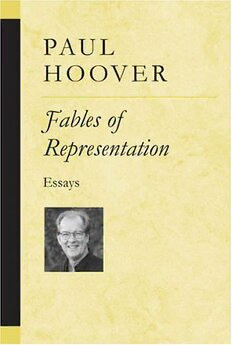
Fables of representation : essays PDF
Preview Fables of representation : essays
PA U L H O O V E R Fables of Representation Essays Fables of Representation POETS ON POETRY David Lehman, General Editor Donald Hall, Founding Editor New titles Dana Gioia, Barrier of a Common Language Paul Hoover, Fables of Representation Philip Larkin, Further Requirements Karl Shapiro, Essay on Rime Charles Simic, The Metaphysician in the Dark William Stafford, The Answers Are Inside the Mountains Recently published Thomas M. Disch, The Castle of Perseverance Mark Jarman, Body and Soul Philip Levine, So Ask David Mura, Song for Uncle Tom, Tonto, and Mr. Moto Stephen Yenser, A Boundless Field Also available are collections by A. R. Ammons, Robert Bly, Philip Booth, Marianne Boruch, Hayden Carruth, Fred Chappell, Amy Clampitt, Tom Clark, Douglas Crase, Robert Creeley, Donald Davie, Peter Davison, Tess Gallagher, Suzanne Gardinier, Linda Gregerson, Allen Grossman, Thom Gunn, Rachel Hadas, John Haines, Donald Hall, Joy Harjo, Robert Hayden, Edward Hirsch, Daniel Hoffman, Jonathan Holden, John Hollander, Andrew Hudgins, Josephine Jacobsen, Weldon Kees, Galway Kinnell, Mary Kinzie, Kenneth Koch, John Koethe, Yusef Komunyakaa, Richard Kostelanetz, Maxine Kumin, Martin Lammon (editor), Philip Larkin, David Lehman, Philip Levine, Larry Levis, John Logan, William Logan, William Matthews, William Meredith, Jane Miller, Carol Muske, Geoffrey O’Brien, Gregory Orr, Alicia Suskin Ostriker, Ron Padgett, Marge Piercy, Anne Sexton, Charles Simic, Louis Simpson, William Stafford, Anne Stevenson, May Swenson, James Tate, Richard Tillinghast, Diane Wakoski, C. K. Williams, Alan Williamson, Charles Wright, and James Wright Paul Hoover Fables of Representation essays Ann Arbor Copyright © by the University of Michigan 2004 All rights reserved Published in the United States of America by The University of Michigan Press Manufactured in the United States of America (cid:1) Printed on acid-free paper 2007 2006 2005 2004 4 3 2 1 No part of this publication may be reproduced, stored in a retrieval system, or transmitted in any form or by any means, electronic, mechanical, or otherwise, without the written permission of the publisher. A CIP catalog record for this book is available from the British Library. Library of Congress Cataloging-in-Publication Data Hoover, Paul, 1946– Fables of representation : essays / Paul Hoover. p. cm. — (Poets on poetry) ISBN 0-472-09856-X (alk. paper) — ISBN 0-472-06856-3 (pbk. : alk. paper) 1. American poetry—20th century—History and criticism. 2. Poetry. I. Title. II. Series. PS323.5 .H58 2004 811(cid:1).509—dc22 2003015076 ISBN13 978-0-472-09856-9 (cloth) ISBN13 978-0-472-06856-2 (paper) ISBN13 978-0-472-02601-2 (electronic) Acknowledgments Thanks to David Lehman for his helpful editing, which resulted in the writing of “Fables of Representation” and other important manuscript changes. I am also grateful to Nathaniel Mackey for his comments on “Pair of Figures for Eshu”; Dr. Samuel A. Floyd, Jr., for inviting me to participate in the Interarts Studies Semi- nars of the Center for Black Music Research; and David McCart- ney, Archivist at University of Iowa Library, for locating the Michael Palmer essay “Counter-poetics and Current Practice.” My gratitude also to the editors of the publications in which these essays appeared: Charles Henry Rowell and Paul Naylor (Callaloo), Annie Finch and Kathrine Varnes (An Exaltation of Forms), David Bonanno (American Poetry Review), Chad Faries and Jayson Iwen (Cream City Review), Michel Delville and Chris- tine Pagnoulle (The Mechanics of the Mirage), Bin Ramke (Denver Quarterly), Neil Shepard (Green Mountains Review), Larry Kart (Chicago Tribune),Anne Waldman (Nice to See You: Homage to Ted Berrigan), Dr. Samuel A. Floyd, Jr. (Lenox Avenue), and Devin Johnston (Chicago Review). As always, I am indebted to Maxine Chernoff for her love and support. Contents The New Millennium: Fifty Statements on Literature and Culture 1 Murder and Closure: On the Impression of Reality in American Poetry 4 Pair of Figures for Eshu: Doubling of Consciousness in the Work of Kerry James Marshall and Nathaniel Mackey 26 Stark Strangled Banjos: Linguistic Doubleness in the Work of David Hammons, Harryette Mullen, and Al Hibbler 56 The Postmodern Era: A Final Exam 73 Fables of Representation: Poetry of the New York School 76 Upper Limit Music (Counted Verse) 128 The New Modernism 136 A Score for Undetermined Moments 145 The Poet in His Skin: Remembering Paul Carroll 163 Last Chicago Days: In Memory of Ted Berrigan 172 Journals of Addiction 175 The New Millennium Fifty Statements on Literature and Culture (Agree or Disagree) 1. The word “consumer” has replaced the word “citizen” in most forms of discourse. 2. Traditional culture is the enemy of consumerism. 3. Media culture collaborates with consumerism to destroy traditional beliefs. 4. Postmodern theory was created to confuse and intimidate the average literate citizen. 5. Avant-gardes are a necessary aspect of late capitalism. 6. Poetry has the same connection to social class that it had under aristocratic social orders. 7. The erotic allure of narrative lies in the courtship of au- thor and reader, usually involving the courtly deference of the former to the latter. The eroticism of nonnarrative lies in the shared refusal of normal relations. 8. The mind can only conceive of uncertainty as a certainty—in other words, as an image. But images are of interest only when they communicate an uncertainty. 9. Poems are entirely factual. 10. The list, or series, is the major organizing principle of writing. 11. The out-of-sequence series is the organizing principle of most avant-garde writing. 12. The “new” in art is always imported from another culture. 13. Annihilation is the sincerest form of Battery. From Chicago Review43, no. 4 (1997): 3–6.
